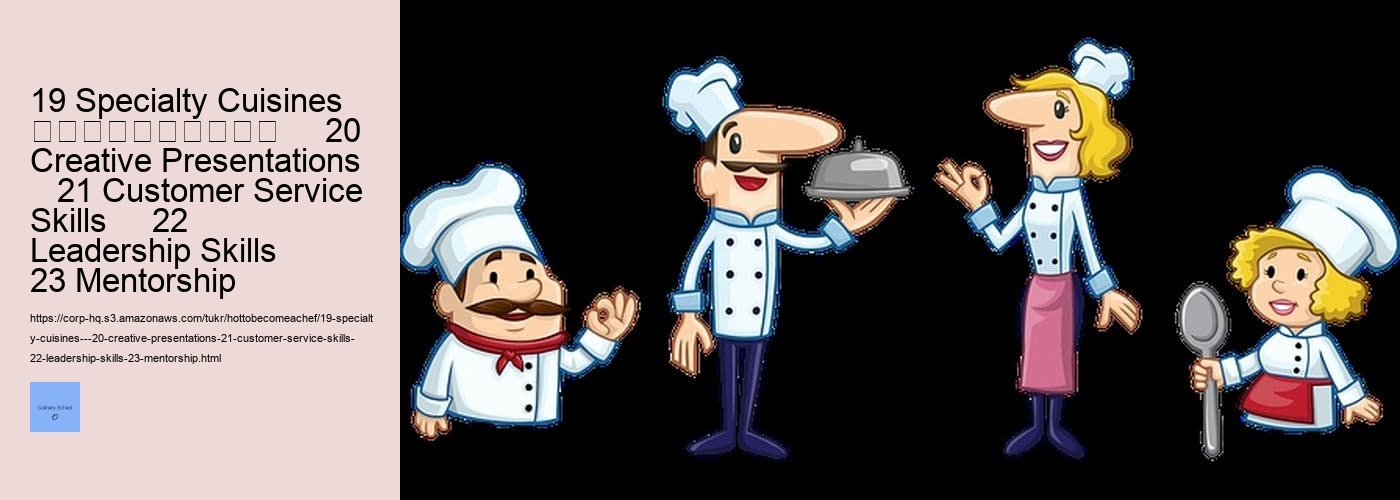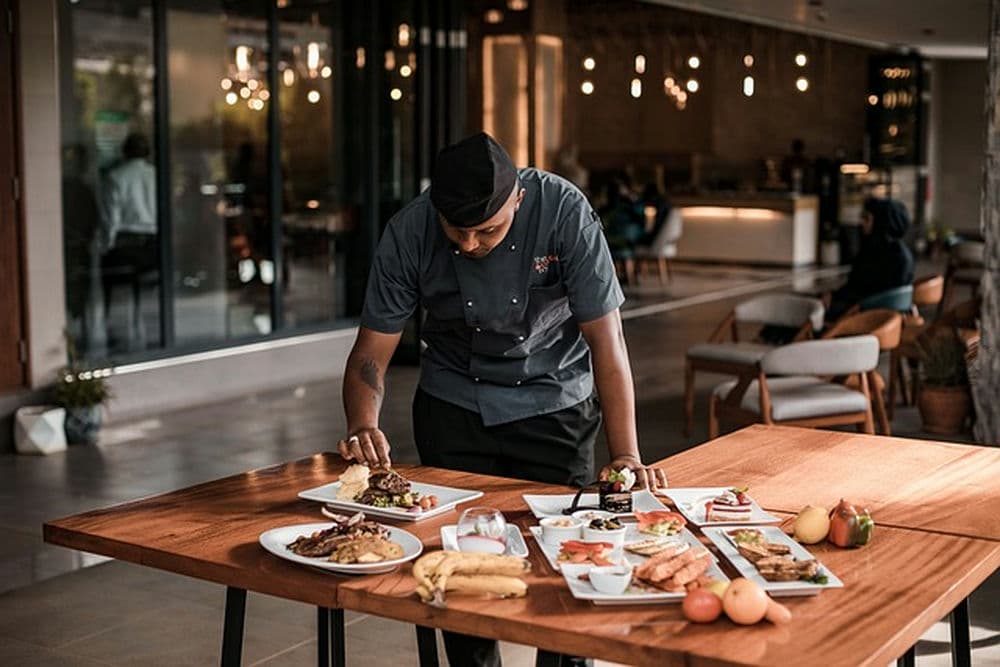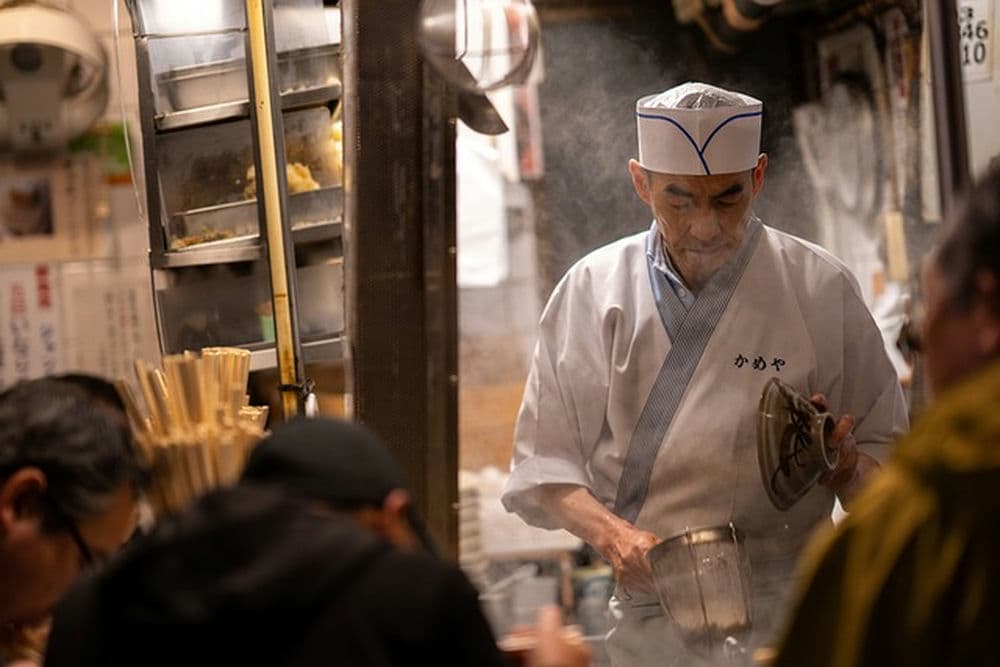

Specialty cuisines are a fun way to experience different cultures and explore the world of food. Finding employment as a private chef provides the opportunity to craft customized menus and creatively prepare meals for families. Culinary Training Menu planning. Landing a job as a chef in an acclaimed establishment involves building relationships with food vendors, distributors and fellow industry professionals. How to become a chef Networking. Gaining experience working in restaurant kitchens under experienced chefs allows you to build fundamental cooking skills while learning how to thrive in a fast-paced work environment. Culinary Training Apprenticeship. Many chefs choose to compete in cooking competitions to gain exposure for their skills and business ventures. How to become a chef Ingredient knowledge. It is an exciting way to taste delicious dishes you've never tried before. The flavors can be quite intense and unique, which makes it a great option for those looking for something new and exciting! (There's no doubt that) trying out different specialty cuisines can be a thrilling adventure.
Creative presentations are also highly important when it comes to introducing people to new flavors. This could include plating the food in interesting ways, using uncommon ingredients, or utilizing unexpected cooking techniques. Presenting these dishes in an attractive manner will help capture the customer's attention and make them more likely to try something they might not have considered before! Additionally, customer service skills are necessary as well; when customers feel cared for and appreciated they're more likely to return.
Leadership skills also play an important role in creating successful specialty cuisine restaurants. Knowing how to delegate tasks, set goals, maintain morale, and resolve conflicts between staff members is essential for running a successful business. Furthermore, mentorship roles can help ensure that employees are continuously learning and developing their own culinary skills so they can provide customers with better service each time they visit!
In conclusion, specialty cuisines require creative presentations as well as excellent customer service skills if businesses want to keep their customers coming back for more. Moreover, strong leadership and mentorship roles must be present within the restaurant in order for it to thrive! With all of these components working together successfully, anyone seeking out flavorful experiences won't be disappointed!

A. Introduction (for topics 19-23)
Wow! What a range of topics! From specialty cuisines to customer service skills, leadership and mentorship – we have it all covered. Firstly, let's take a look at the delicious world of unique cuisine; no two dishes are ever the same! We'll then move onto creative presentations and how they can help you stand out from the crowd. After that, we'll cover the importance of providing great customer service and hone in on some key leadership skills. Finally, we'll explore mentorship and how it can be beneficial for personal growth. So without further ado, let's get started!

Working abroad for a diverse experience can be an incredibly rewarding and exciting opportunity.. It can open up new doors and provide many unique experiences unavailable in one’s own country. (However,) it is important to consider the potential risks and drawbacks associated with working in a foreign setting.
Posted by on 2023-09-03

Pursuing employment opportunities with established chefs can be an exciting and rewarding experience.. It is important to consider apprenticeships with experienced chefs, as they provide a unique opportunity for aspiring cooks to learn the basics of cooking and gain valuable kitchen skills.
Posted by on 2023-09-03
Types of cuisine are an important factor when it comes to creating a successful restaurant. It's no surprise that specialty cuisines have become so popular in recent years, as they offer something unique that customers can't get anywhere else. From creative presentations to customer service skills and leadership abilities, having the right type of cuisine is essential for any eatery.
When it comes to specialty cuisines, there are many options available; from Italian, Mexican, Indian and Chinese dishes to fusion cuisine and vegan fare. For example, a Mexican-style restaurant may feature burritos, tacos and quesadillas as its main dishes while an Italian restaurant could offer pizza and pasta dishes with various sauces. Additionally, some restaurants specialize in certain types of food such as sushi or dim sum. No matter what type of cuisine you choose for your establishment, it should be well-prepared using fresh ingredients and spices in order to ensure the best possible quality for customers.
Furthermore, creative presentations can make all the difference when it comes to a successful restaurant experience. Presenting food in an aesthetically pleasing way can really help enhance the overall dining experience for customers and make them feel like they're getting something special. This includes plating food nicely on plates or using fun garnishes or decorations on top of dishes – anything that will give an extra 'wow' factor!
Of course, customer service skills are also key when running a successful eatery. Staff must be friendly and welcoming towards customers in order to create a positive atmosphere that encourages patrons to return in future visits. This includes providing excellent customer service when taking orders or dealing with complaints efficiently – always aiming to create a satisfying outcome for everyone involved!
Finally, strong leadership skills are paramount when managing any kind of business venture - especially one involving serving food! A manager must be able to delegate tasks effectively amongst staff members while keeping morale high throughout shifts; making sure everyone is working together harmoniously towards common goals within the workplace.(!) Mentorship is also important here; experienced team members should provide guidance and advice where necessary in order to help junior staff develop their own strengths over time - this will ensure efficient operations at all times!
In conclusion(,) having the right type of cuisine combined with creative presentation techniques along with effective customer service skills plus strong leadership abilities coupled with mentorship opportunities can really work wonders when establishing a successful eatery!


Specialty cuisines offer a unique and creative way to dine and learn about different cultures. They can provide health benefits such as providing nutrient rich food, reducing the risk of certain diseases, and helping with weight management. Creative presentation plays an important role in how these specialty dishes are served. Plating is key in showcasing the meal in an attractive manner which helps to enhance flavors! A well trained chef or waiter who has customer service skills can ensure that the diners get the full experience they are looking for.
Leadership skills are essential when it comes to managing a kitchen staff, especially one that specializes in cuisine from various cultures. Not only is it important to train them properly but also give them clear direction on what is expected of them. Mentorship is another vital part of nurturing a successful team as it allows for growth and development between colleagues (and even customers). An effective leader will be able to guide their team in honing their craft while ensuring that all parties involved have a great experience!
All of these components come together to create an amazing dining atmosphere where everyone feels welcome and content with what they receive. The combination of exquisite tastes, stunning presentations, excellent customer service and strong leadership creates an unforgettable experience!

Specialty cuisines, creative presentations and customer service skills have one important factor in common: regional differences. Depending on where you are located, the type of cuisine or presentation style may vary drastically. For example, a customer in the United States might expect to find Mexican food at a restaurant while someone in Japan would be expecting sushi. Similarly, presenting information to an audience from India will likely require different tactics than presenting to an audience from Russia! (Negation) Regional differences also apply when it comes to leadership and mentorship styles. For instance, leaders in China tend to expect more obedience from employees than American bosses do! In addition, mentors in Germany emphasize taking initiative more than those based in France!
However, while regional variations can present challenges for businesses that operate across multiple countries or regions, there are strategies that can help bridge gaps between cultures. Training programs can help ensure that employees understand expectations within each region and teach how to adapt their approach accordingly. Furthermore, teams made up of people from diverse backgrounds can increase collaboration and understanding between different locales. Ultimately, with the right combination of resources and personnel companies can use regional differences as an opportunity instead of a disadvantage.(Transition Phrase)
By recognizing and embracing different cultures' approaches to activities like cooking or leading meetings, organizations open themselves up to new ideas and perspectives that may not have been available otherwise! With this kind of cultural appreciation comes innovation and growth which is essential for any successful business! (Exclamation Mark) By actively seeking out opportunities for cultural exchange and collaboration we don't just benefit our own company but also improve global relations!
When it comes to specialty cuisines, creativity is key! Presenting unique dishes that tantalize the taste buds of customers can be a real challenge. However, with enough imagination and skill, creative presentations can take any meal to the next level. (For example,) you could use different spices or herbs to add a unique flavor or choose plating techniques that make each dish look as good as it tastes.
But don't forget customer service skills. It's important to remember that excellent customer service is essential when serving up these culinary delights. Being friendly, attentive and helpful will ensure that customers come back for more! Also, being able to explain the ingredients and flavors of each dish in detail will help customers make an informed decision.
Leadership skills are equally important when running a successful business. Being able to motivate your team and delegate tasks effectively can help keep operations running smoothly. Moreover, setting clear goals for everyone will help employees stay on track and reach their full potential.
Finally, mentorship plays an integral role in creating a positive work environment. Mentors provide guidance and advice which allows employees to develop their skills further and become better at their job overall! Encouraging open communication among team members also fosters collaboration which helps them perform better collectively.(After all,) having strong interpersonal relationships in the workplace is always beneficial!
In conclusion, all these qualities must work together in order for any specialty cuisine business to succeed - from creative presentations down to mentorship; they all have a part to play! So if you want your specialty cuisine business to thrive, focus on honing these skills consistently!

Crafting an effective presentation is a skill that is essential for success in many areas, especially leadership skills and customer service! It's not just about the content; it's also about how you present it. Through creative presentations, one can ensure their audience is engaged and intrigued by the topic at hand. For example, with specialty cuisines, using visuals such as photos or videos of the meals being prepared can spark interest in the crowd. Additionally, pairing this with relevant stories or anecdotes to bring a personal touch to the presentation creates an even more impactful experience.
Moreover, having a solid structure for your speech can make all the difference when crafting an effective presentation. Make sure to form a clear introduction which will capture your audience's attention and provide an outline of what they should expect. Furthermore, use transitions between sections so that your argument flows coherently and has continuity throughout. Finally, end on a high note with either some powerful words or asking a thought-provoking question that will leave them wanting more!
Lastly, mentorship plays an important role in honing these skills further. Seek out advice from experienced professionals who have mastered the art of delivering compelling presentations; they'll be able to give invaluable feedback regarding how to improve your own delivery style as well as offer tips on captivating different types of audiences. With practice and dedication comes mastery - so don't be afraid to take risks and try new things! (You never know what might work!)
Visual aids and graphic design ideas are important tools for a variety of topics. For example, when it comes to specialty cuisines, visual aids can help convey the unique tastes and textures that make them so special. Creative presentations can also benefit from visuals to help captivate the audience. Likewise, customer service skills and leadership skills can be demonstrated through visuals, as well as mentorship!
Nevertheless, it is essential to ensure that your graphics are effective in conveying their message - otherwise they won't do any good! (Therefore), it is important to consider how colors, shapes and images will be used in order to create an aesthetically pleasing yet informative look. Furthermore, it's also crucial to take into account how viewers will interpret these graphics; allowing for different interpretations based on someone's background or culture can provide valuable insights into what works best. Finally, don't forget about technology - modern solutions such as virtual reality or augmented reality could revolutionize the way you communicate your message!
Moreover, one should not underestimate the power of storytelling with graphics. This can help people better understand complex concepts or connect emotionally with a brand or product. Additionally, using illustrations rather than photos often leads to more successful results; this is due to the fact that illustrations tend to evoke more emotion in viewers than photographs do. Subsequently, incorporating illustrations into your visuals is often worth exploring!
In conclusion, graphic design ideas are key components when communicating various topics such as Specialty Cuisines, Creative Presentations , Customer Service Skills , Leadership Skills and Mentorship . Thus(ly), combining creativity with clarity and purposeful messaging has great potential for success!
Specialty cuisines have been a popular topic of conversation lately. It can be difficult to keep an audience engaged when discussing such a specific subject, but there are various engagement techniques that can help! For example, using multimedia such as videos or slideshows to illustrate points (this will make it more interesting for the listeners!). Additionally, providing real-world examples of how this type of cuisine is being used in current food trends can be very compelling.
Transition Phrase: Moving on to...
Creative presentations are another way to capture and maintain an audience's attention. Incorporating humor and storytelling into your presentation can break up information and keep people from becoming bored. Another tactic is to ask questions throughout your talk, as this encourages participation and allows for a two-way dialogue between you and your audience.
Transition Phrase: Moreover...
Customer service skills are also essential in any situation where you're trying to engage with an audience. Showing respect and politeness go without saying; however, actively listening to what people have to say is key! Taking notes or summarizing what they said will demonstrate that you are paying attention which will only further enhance the conversation.
Transition Phrase: Finally...
Leadership skills play an important role in engaging audiences too! Being able to confidently present ideas while remaining open-minded enough for others' input is vital for successful communication. It's also important not to forget about mentorship - having someone with experience who can provide advice and guidance when needed will ensure the discussion stays on track!
Overall, there are many different tactics one can use when striving for successful engagement with their audience - no matter the topic at hand!
Specialty cuisines (can be) a great way to spice up any dinner party. From French to Mexican, there's sure to be something for everyone! Creative presentations are also key when it comes to showing off your cooking skills. Plating and garnishing dishes attractively can really take your meal to the next level.
Customer service skills are also an important part of running a successful culinary business. Showing customers respect and attentiveness is essential in creating a warm atmosphere and ensuring that they have an enjoyable experience. Neglecting this area could result in lost business!
However, leadership skills are just as critical when it comes to managing a kitchen staff or restaurant staff. Being able to delegate tasks effectively and motivate employees will help ensure smooth operations behind the scenes. Additionally, mentorship can be extremely beneficial for advancing one's career as well as helping others progress theirs. Teaching younger generations the art of cooking can help spread knowledge about different specialty cuisines around the world!
In conclusion, while specialty cuisines may make up the main course, customer service skills, leadership skills and mentorship all play an integral role in creating a successful culinary experience overall!
Understanding customer needs and expectations is key to success in the specialty cuisine industry. It's (important) to have a thorough understanding of what customers require, not only when it comes too ingredients but also how they want their food presented. Additionally, it's essential for chefs to have strong customer service skills! This means they must be able to provide a warm welcome, answer any queries effectively and show empathy towards diners.
Leadership skills are also important as chefs must manage their team effectively. From motivating individuals to ensuring tasks are completed on time, a chef should be capable of leading the kitchen staff efficiently. Furthermore, mentorship plays an integral role in any culinary environment. Chefs should be able to guide junior members of staff so they can learn new techniques and hone their knowledge of cooking styles.(Moreover,) they should help them develop their interpersonal skills when interacting with guests.
In conclusion, possessing these attributes will ensure excellent customer experiences when dining at specialty restaurants. By understanding what diners desire from their meals and having the necessary skillset for running a successful kitchen; chefs can provide an outstanding service that meets all expectations!
Building Rapport with Customers is an important skill for any business. It (can) help create positive relationships between customers and the business, as well as ensuring customer satisfaction. This can be attained through active listening, being empathetic to customers needs and wants, and providing a friendly experience. Firstly, it is important to actively listen to the customer's needs so that you can understand their exact requirements; this also shows that you are paying attention and care about what they have to say. Secondly, it's imperative that you show empathy towards your customers; this can be done by putting yourself in their shoes so that you can sympathise with them better. Lastly, having a friendly attitude when dealing with customers is essential – it makes them feel more comfortable around you and helps build trust.
Furthermore, establishing rapport goes beyond just being friendly; it involves understanding different cultures too! You should take the time out to learn about different cultural nuances in order to ensure that all customers feel welcome in your store or restaurant. Additionally, using language which resonates with different cultures will make them feel more at ease when conversing with you; thus leading to better communication skills overall! For example, if someone speaks Spanish fluently then use Spanish words or phrases wherever appropriate.
In conclusion , building rapport with customers plays a crucial role in customer service skills - this includes actively listening, showing empathy and understanding different cultures. By taking the time out to get familiar with these practices one could help ensure customer satisfaction while creating positive relationships between the company and their clients!.
Specialty cuisines can be an exciting way to spice up any dinner party. Guests are always surprised and delighted by the unique dishes that can be prepared with ingredients from around the world. However, creating a successful specialty cuisine meal requires more than just good cooking skill; it also requires strong leadership skills (like organization, delegation, communication and problem-solving). In order to create a memorable culinary experience for your guests, you must have the ability to lead your team of cooks and servers effectively.
Leaders must be able to effectively coordinate tasks among their staff members in order to ensure that everything runs smoothly. They should delegate specific responsibilities so that everyone knows what is expected of them and when it is due. Additionally, leaders should clearly communicate their expectations for quality and timeliness in order for all members of the team to work together harmoniously towards a common goal. Furthermore, they need to anticipate potential problems ahead of time and devise solutions quickly during unexpected scenarios.
Creative presentations are also essential for making each specialty cuisine meal stand out from the rest. Leaders must be able to think outside of the box in order to design eye-catching arrangements that will make guests' mouths water! They must take into consideration factors such as presentation style, plate size, colors used on platters etc., in order to create visually appealing plates that reflect the flavors being served. Moreover, leaders need great customer service skills in order to provide attentive yet unobtrusive service throughout each course - this helps give diners an unforgettable experience! (It also ensures they come back again!)
In addition, having a mentor who has had success with specialty cuisines may be incredibly beneficial! Mentors can offer advice on how best to manage difficult situations as well as share tips on how best organize staffs for maximum efficiency. They can also help hone one's leadership skills by providing feedback on techniques used throughout the meal preparation process. It's important not only for aspiring leaders but chefs too - mentors are invaluable resources!
Overall, there's no doubt that leading a specialty cuisine meal requires excellent leadership skills along with creative presentations plus superb customer service abilities - all backed up by mentoring support if needed! With these tools at hand one can guarantee an extraordinary dining experience that will leave people wanting more!
Leadership skills are essential for success in any field. From developing effective communication strategies to inspiring innovation and recognizing accomplishments, strong leaders know how to motivate employees to high performance levels while fostering positive working environments (and even delegating responsibilities effectively). Being able to make sound decisions in challenging situations and evaluate program outcomes is important for achieving strategic plans and implementing change management processes.
Moreover, building relationships with stakeholders, guiding teams towards their goals and analyzing performance data for continuous improvement are all part of the equation. Excellent leaders can also ensure compliance with regulations and policies as well as foster an organizational culture of excellence by encouraging collaborative teamwork and problem-solving techniques. Lastly, they should celebrate successes by commending employees and mentorships(understanding the role of a mentor) .
Mentorship plays a significant role when it comes to leadership as well. Establishing trust with mentees, providing constructive feedback, sharing knowledge and experiences, developing individualized growth paths, recognizing achievements, supporting professional development and encouraging self-efficacy are all crucial components of mentorship that help create an environment where everyone can succeed!
On top of that, being creative in presentations is necessary in order to engage customers and clients alike. Moreover, having great customer service skills allows you to make sure everyone's needs are met quickly and efficiently! Furthermore, getting familiar with specialty cuisines can be beneficial if you want to stand out from the crowd or bring something new into the mix! Finally, don't forget about inspiring innovation - it can be the key factor that drives your business forward!
In conclusion, leadership requires many different competencies which include everything from understanding mentorship roles to providing excellent customer service skills. By focusing on these core elements one can ensure success not just for themselves but also for their team members or colleagues. It's up to each leader to determine what works best for them; however keeping these principles in mind will surely yield positive results!
